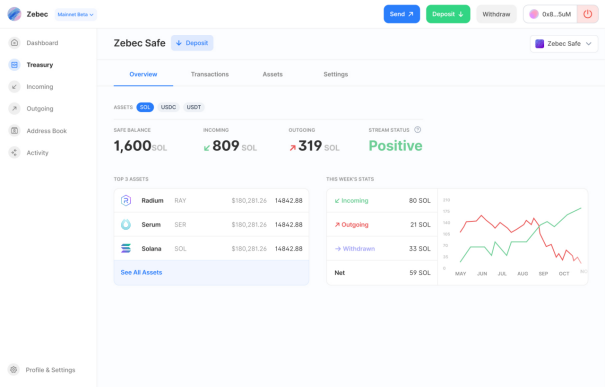Salary payment service has always been a rigid demand service for global employers. It is understood that more than half of the small and medium-sized enterprises in the world will outsource salary payment and salary calculation related services and pay related service fees. In particular, some companies with a relatively large number of employees, as well as some companies with relatively large employee turnover, usually choose the salary payment service method to regulate. At the same time, this is also expected to further reduce the expenditure and energy investment of enterprises in related aspects. At present, such services are mainly provided by traditional banks, human resources companies, and financial payment-related companies. Although there are currently no relevant exact statistics on the market size in this field, we have reason to believe that this track is a very broad blue ocean market.

We have seen that, usually, companies that provide such services charge relatively high service fees, and many companies say that after paying the relevant service fees, the salary payment service provider will not provide customized services. There may also be delays in the payment of wages. Although such tripartite agencies usually help companies pay salaries according to the agreed date, there are still some trust risks, especially in some legally unsound regions or countries.
At present, Zebec Protocol, a settlement agreement built on Solana, is based on blockchain technology, reshaping the traditional salary payment field to de-triple and credible, and further promoting the field to Web3.
Zebec Protocol builds a new TradeFi ecosystem
Zebec Protocol is a continuous settlement protocol built on Solana, which can help demanders build a continuous payment solution based on different needs, such as in the form of cryptocurrency, providing financial transactions in salary, payment, investment and shopping. Real-time, continuous flow of funds. The transfer and payment of funds in Zebec Protocol will be based on pre-set smart contracts, and the pre-established payment plan will be automatically executed. At the same time, each payment will be evidence-based on the chain.

Based on Zebec Protocol, constructing a payment scheme such as salary payment will use smart contracts as the main execution role, which means that tripartite institutions will no longer be required as the main executor and save costs. As the infrastructure of TradeFi, Zebec Protocol will also be able to serve more fields, such as shopping, financial services, financing, investment and other fields, reducing service costs, trust thresholds and execution efficiency.
Zebec Protocol is also using multi-signature technology to implement customized security management of funds, and is capable of streaming funds per second for payment schemes, and can be suspended, resumed, and canceled at any time. Zebec Protocol will also be able to integrate with more DeFi protocols, DeFi developers and Web3 applications to support potential financial scenarios.
At present, Zebec Pay is the first application built based on Zebec Protocol. Zebec Pay is a tax-compliant on-chain processing system that allows employees to receive USDC or other stable coins as compensation in real time, and employees can convert part of their salary For mainstream cryptocurrencies, or allocate funds to compliant encrypted IRA and 401k accounts, to further seek compliance and review of cryptocurrencies as payment methods.

The salary issuer only needs to use a wallet that supports SPL assets such as Phantom to connect to Zebec, enter the wallet address of the payee (employee), and then start to build a streaming fund transmission. Once recipients receive funds in their wallets, they can opt for a free fiat exchange, all handled entirely on-chain. Zebec Pay will process every transaction on the chain in real time based on the Solana blockchain, and the handling fee is almost negligible. In addition, Zebec Pay can also help collection employees, formulate DeFi-based income strategies, and improve the utilization rate of funds. At the same time, it is also expected to further promote the audience of encrypted assets as a means of salary payment.
Zebec Protocol's business model and development prospects
Zebec Protocol can provide settlement services for many demanders, and Zebec Pay is just one of the early scenarios. At present, in the continuous settlement sector, Zebec Protocol has almost no competing products in the Web3 sector, and the code is open source and continuously optimized, which means that there will be no substitute in a short period of time, and Zebec Protocol is also being acquired including Visa Favored by traditional payment giants, Zebec Protocol is expected to further provide them with new solutions for encrypted asset payments.
From the perspective of business model, every demander who uses Zebec Protocol services needs to charge a low system subscription fee, and providing users with real-time payment services will also charge low Gas fees, while traditional payment institutions such as Visa The cooperation, as the settlement layer on the blockchain, will also bring a considerable amount of income.

From the perspective of traditional fields, demanders and tripartite organizations usually establish a cooperation cycle of 2-8 years in the field of salary payment, and Zebec Protocol, as a more advantageous Web3 settlement ecology, is expected to use 2 years as the initial cooperation period. According to the Zebec Protocol team, when Zebec Protocol has a turnover of 20 million US dollars, it is expected to bring a net profit of 2 million to 6 million to the ecology. Zebec is currently the first ecosystem in the Web3 field to provide a streaming payment system, and it is also one of the few companies in the industry that has generated positive cash flow from the early stage. After 2-3 years, the C-end users of the Zebec Protocol real-time payment system Break through 2 million people and build an impenetrable moat for Zebec.
From a trend point of view, the Web3 industry is developing rapidly, and Web3 projects are also springing up like mushrooms after rain. More and more talents are pouring into the Web3 world. They are all users with high acceptance of encrypted assets, which means that encrypted assets As a means of settlement, it will become more popular and popular, which is an opportunity and potential prospect for Zebec's ecological development. As a Web3 infrastructure facility, the Zebec Protocol ecology has strong value capture capabilities, especially for value capture at the protocol layer. However, Zebec Protocol (such as Zebec Pay) has an immeasurable role in the single direction of the salary settlement field. potential. From a general perspective, any field related to settlement is expected to become a potential server of the Zebec Protocol ecology.
In fact, Zebec Protocol has reached a TVL of 300 million US dollars without any pledged mining. For this reason, not only Solana’s foundation invested 3 million US dollars in Zebec Protocol, but Anatoly Yakovenko, the founder of Solana, also served as Zebec consultant, providing all-round support for the development of the Zebec project. At present, 1/3 of the Solana project uses the Zebec system to pay wages, and the number of early users has reached 30,000+. According to Solana’s existing ecological scale, Zebec Protocol’s TVL is expected to quickly reach more than 1 billion US dollars, and Zebec Protocol brings a lot of revenue, which can be used for the development of Zebec Protocol.
According to the plan, when the number of Zebec Protocol's C-end users exceeds 2 million, Zebec will develop an independent public chain system, and when Zebec's cash flow reaches 1 trillion US dollars, Zebec will issue tokens based on 1:1 exchange. Stable currency USDZ, to better serve the development of the ecology. Although the current Zebec Protocol is mainly aimed at payment and settlement services based on cryptocurrencies in the Web3 world, in fact, Zebec Ecology intends to further acquire many traditional payment companies after building a certain scale, so as to further touch and solve the actual situation of Web2 companies. Payment issues, and accelerate the popularization of encrypted assets, lowering the threshold for reaching traditional users.
In general, the Zebec Protocol ecology has considerable practical significance, and it can further deeply link the Web3 and Web2 worlds, which is very promising. Although the encryption market performed poorly in the first half of this year, the Zebec Protocol ecology still has an amazing early market performance. With the promotion of well-known capital in the industry such as OKX Ventures, Circle, Coinbase, Solana Ventures, Lightspeed Venture Partners, and Alameda Research, Zebec Protocol is expected to further accelerate the large-scale adoption of its own ecology.